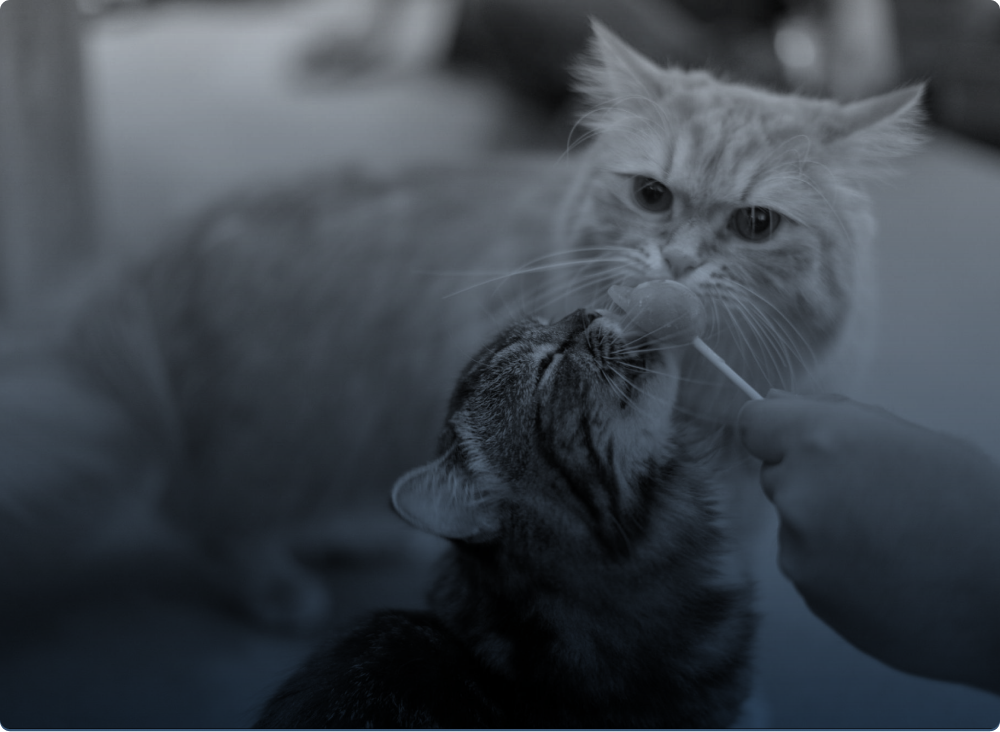
What human food can cats eat?
There are a number of human foods that our feline friends can eat. However, it's important to know which foods are safe for your furball and how best to prepare them to avoid accidentally poisoning your cat or making them sick.
Can cats eat human foods?
Cats are very simple eaters, and they can get most of their nutrients from high-quality meats and cat food. That being said, yes - cats can eat certain human foods. However, most of the foods in the following list should be given sparingly or as a treat only, in addition to their regular pet food.
When introducing any new food to your cat, it's important to do it slowly to see how they react. They might have an unknown allergy, or just genuinely dislike it, and humans and cats alike don’t like to be forced to eat food they don’t like.
It’s also important to take note of how to prepare each food to avoid your cat choking or not being able to digest it properly. If you aren’t sure about a certain food or how to prepare it, have a chat with your vet before feeding it to them. It’s better to be safe than sorry!
What vegetables can cats eat?
Vegetables are very high in nutrients, so a small amount can be great for cats and assist with gut issues and dehydration. However, just like humans, this doesn’t mean they necessarily enjoy them!
Cats mostly rely on animal proteins to get their nutrients, so vegetables only need to be occasional or in small doses to give them an extra vitamin boost.
While vegetables are very beneficial to humans, they don’t necessarily have the same high nutritional benefit for cats, so don’t feel obliged to make them a part of your cat’s diet.
Most vegetables need to be prepared a certain way before feeding them to your cat, as it can be hard for them to digest or could be a choking hazard. If cooked, make sure the vegetables have cooled down before you give them to your cat.
-
Asparagus: Fully cooked and cut small
-
Broccoli: Cut into florets and cooked thoroughly
-
Carrots: Peeled, diced and cooked until soft
-
Celery: Cut small
-
Cucumber: Peel and cut into small strips
-
Green beans: If canned, make sure sodium-free
-
Lettuce: Washed thoroughly and chopped
-
Peas: Cooked (only serve to adult cats as they can be a choking hazard to kittens)
-
Pumpkin: Remove skin and seeds, cooked until soft
-
Spinach: blanched and sliced (do not feed to cats with urinary issues)
-
Zucchini: Cooked, peeled and cut small
Can cats eat fruit?
Cat’s can eat most fruits but in small doses. This is because fruit is high in sugar, and a large amount could lead to diabetes or obesity.
Fruit is high in vitamins, fibre and antioxidants, so a small portion of fruit as a treat can be great for a cat’s health. Be wary to remove anything they could potentially choke on, such as skin, seeds or stalks, and cut into small pieces to make it easier to chew.
Some of the main fruits that cats can eat include.
-
Apples: Remove the peel and seeds, cut into small slices or cubes
-
Bananas: Peel back, fresh or frozen and sliced
-
Blueberries and raspberries: Cut into bite-size to avoid choking
-
Cranberries: Can be raw or cooked, but no cranberry sauce
-
Mangoes: Remove skin and cut small
-
Pears: Remove the skin and seeds
-
Pineapple: Remove skin and hard parts, ensure not soaked in sugary syrup if canned
-
Strawberries: Cut off stem and leaves, wash thoroughly
-
Watermelon: Remove rind and seeds
Other human food for cats
On top of fruit and vegetables, there are a few common pantry staples that can also be given to your feline friend. Particularly for some of these foods, ensuring they’re cooked well is crucial.
-
Meat and fish: Never serve raw!
-
Whole grains: Aim for smaller grains, and ensure they’re cooked
-
Eggs: Cook them well
-
Cheese: In moderation. Aim for low-lactose, as some cats become lactose-intolerant with age
-
Rice: Cooked well
-
Oatmeal: Plain oats, preferably served with water and not milk
The worst human food for cats
As much as we like to treat our feline friends as humans, there are some foods we might enjoy that cats just can’t eat. It’s important to especially keep the following foods out of reach from your kitty, as they’re all considered toxic and can make your cat very sick.
-
Onion
-
Garlic
-
Wild mushrooms
-
Green tomatoes
-
Rhubarb
-
Leeks
-
Chives
-
Grapes and raisins
-
Chocolate
-
Macadamia nuts
-
Bread dough
-
Alcohol
-
Caffeine
If your feline friend accidentally gets its paws on one of these foods, monitor for symptoms and call your vet immediately. Take note of how much of the food your cat has eaten and at what time, as this information is very important to vets. If your vet is not open, call the emergency line.
If your cat has eaten a toxic amount, has started vomiting or has diarrhoea, it’s likely you will need to take them to a vet/emergency vet urgently.
Make your cat’s health a priority
We love to treat our feline friends like humans, and this means making their health a priority.
With years of experience in the pet pharmaceutical industry, Scriptly provides high-quality, affordable, and convenient pet care to Australia.
View our range of pet meds available online.


